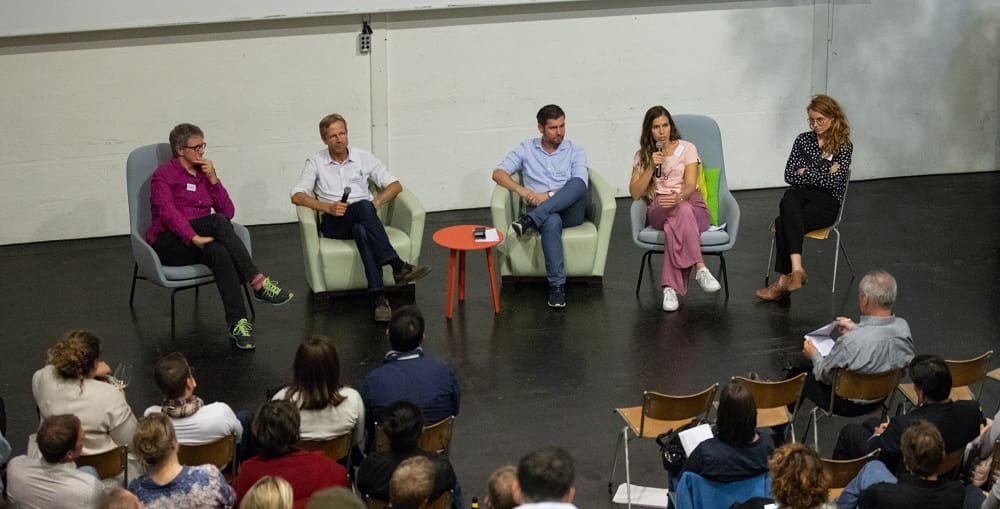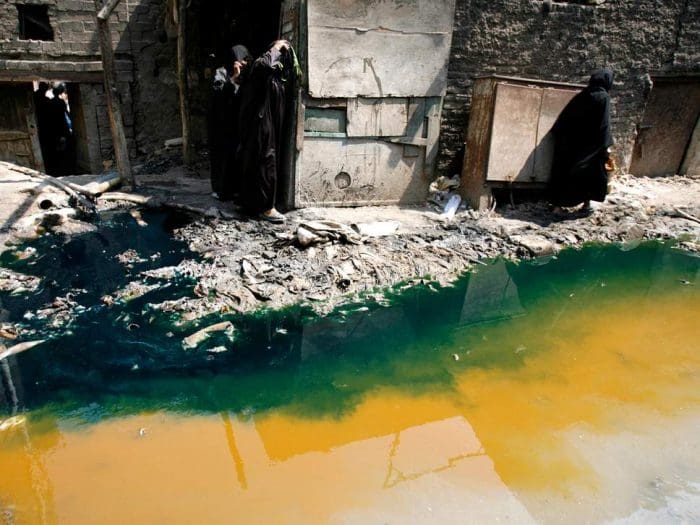What makes an entrepreneur a social entrepreneur? What is a social entrepreneur?
If you immediately thought of a non-profit, government agency or even the actual field of social work, you aren’t alone. At our October event, “What Are the Needs of Social Entrepreneurs?” our partners shared with us that they often encounter a confused look when the word ‘social’ precedes ‘entrepreneur.’
So, social entrepreneurs are just like “regular” entrepreneurs, but their business goals are to have a positive impact on social, cultural, or environmental issues while also supporting themselves with a profitable company.
So, what does this mean? I think it’s best to illustrate this by introducing you to our fabulous line-up of SEs (as the kids say) from the evening, who graciously shared their stories and challenges.

Meet Vom Fass, located in the heart of old town Basel. A boutique shop—actually a franchise, it has local impact. This family-owned business works with small, regional producers to bring in unique, quality items. These include an amazing selection of vinegars, oils, liqueurs, whiskey (my fave!) and even a lovely port-wine all sold à la ‘vom fass,’ meaning you refill your own bottle.
This sustainable approach helps to reduce not only packaging, but all of the resources used to produce containers in the first place (yes, even the recyclable ones). Clever, ain’t it? And because it’s sold by weight, you can buy as little or as much as you like and sample before you buy, both of which eliminate food waste—and money waste. That’s a triple whammy, people!
Next up, meet Ginga, an ethical tee shirt company. Founder Barbara Ortins is a Brazilian designer who, after working for the ‘fast fashion’ industry, decided to create her own brand with an ethical and social purpose inspired by her brother, Guilherme, who has Down Syndrome.
As part of her business plan and design creations, Barbara wanted to highlight the cheerful, sweet and genuine nature of people with Down Syndrome. Because they also tend to be organized and precise, especially in a calm and constant work rhythm, she has devised a work environment that is adapted to their skills and personalities. They draw designs, participate in promotional activities, quality control, packaging and shipping.
One of the struggles of operating in such a way lies on the side any entrepreneur does not have much control over—the customer’s side. Specifically, consumer behavior.
We are probably all guilty of benefiting from ‘fast fashion’—it’s stylish, cool and cheap, so we can afford to enjoy fun trends that are only around for a season, and then buy new things again next time around. But why is it so cheap? How is it possible to sell a sweater for only 30chf when you think of all the materials and people involved in creating this one product? The answer, of course, is anything but cool.

Fast fashion is infamous for exploiting workers as well as having negative environmental impacts. If more people are aware of this—or maybe if more people care about this—then consumer behavior can change. Supply and demand, right?
Changing consumer behavior is also needed in the food industry. Thomas from Vom Fass mentioned that, when working with regional products, this area of the world does not grow strawberries in December, for instance, so you won’t see these items in his store. But because we have imported products that are out of season locally we’ve come to expect—and find—anything we want, whenever we want it. But this behavior has unintended, negative environmental consequences. Clearly, there is a need for more awareness (more to come on that later!) and a change in consumer behavior.
But I digress…our third SE takes us over the German border to the lovely folks at Hof Dinkelberg. This farm addresses both an environmental and a social issue. Not only do they practice biodynamic agriculture, which is better for the earth (and thus, every living thing), but they integrate people with disabilities, too, who can all contribute to the fulfilment of tasks in an appreciative and supportive environment.There are about 30 employees with predominantly mental disabilities.
The team embraces:
- Careful treatment of plants and animals
- Natural, organic foods for thriving human physical, mental and spiritual health
- Promoting dignity, trust, freedom, solidarity and meaningfulness, as well as individual development and the development of all people on and around the farm
If that’s ‘how you roll’ and you’d like to support them by enjoying home-delivered fresh produce (makes a good employee holiday gift, too!), you can learn more here.
If reading about these people is inspiring you to ‘get a move on’ with your own idea, you’ll benefit from knowing the good people at seif. We were lucky enough to hear from the lovely Aimée van der Wolde, who kicked off the evening with a keynote speech. Seif supports social entrepreneurs from all sectors to start, grow and improve their business performance. They do this by offering a Business Creation Seminar, Business Growth Seminar, Impact Academy, and Impact Investing. Furthermore, social enterprises have the possibility to participate in the annual seif awards. Want to learn more? Of course you do! Check it out!
As you can see, the bottom line is: social entrepreneurship is not about just the “bottom line.” Which is not to say money doesn’t matter. Finding investors to start their companies, and making enough money to continue growing their businesses were both identified as needs as well.
In order for this to change though, their main challenge needs to be addressed, and that is awareness—awareness of what the ‘social’ means in social entrepreneur, an awareness of these specific businesses that already exist in the Basel area, awareness of the need for these types of businesses in general, and of the need to support them.
So, what can we do? As for Impact Hub, we intend to use the feedback from our brain-storming sessions that evening as we create content for future programs geared towards helping SEs. Our hope is to fill in the gaps in the current Basel infrastructure for SEs, thus making it easier for them to succeed. And hopefully, before long, these needs and challenges will find themselves long gone.
In the meantime? Well, now that we are all more aware (woo hoo!), can we be a part of the change? After all, ‘voting with your dollar’—or Swiss frank—speaks volumes. And you work hard for your money (“…so haaard for it, honey!” Sorry, but I must honor my inner Donna Summer). But because we work hard for our money, I imagine we’re all careful about how we spend it. Perhaps it’s time we truly give credence to where we spend it as well.
Carrie Aikman
